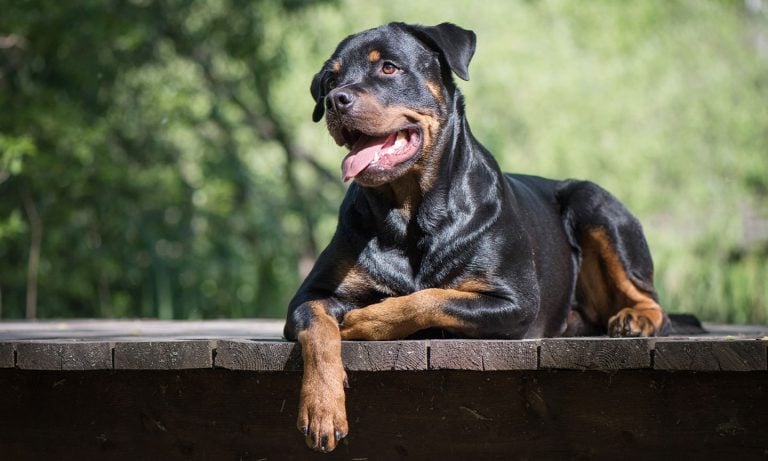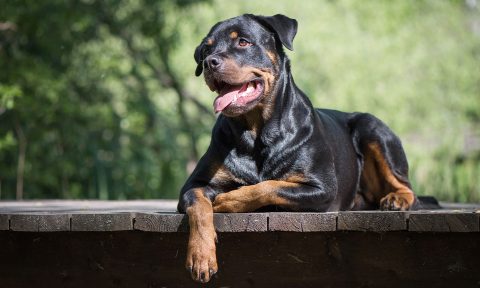Rottweiler vs Boxer

Breed Snapshot
Best For
A popular working breed, Rottweilers do best with experienced pet parents who can provide early training and socialization. These robust, large-sized dogs thrive in homes with active individuals or families, appreciating both mental and physical...
A popular working breed, Rottweilers do best with experienced pet parents who can provide early training and socialization. These robust, large-sized dogs thrive in homes with active individuals or families, appreciating both mental and physical challenges.
Rottweiler Temperament
Rottweilers are powerful and intelligent dogs who benefit from early training and socialization. They are easy to train and eager to please their families, but are also strong-willed and may seem aloof to the outside world. Originally descending from the mastiffs of the Roman legions, Rottweilers have been valuable...
Rottweilers are powerful and intelligent dogs who benefit from early training and socialization. They are easy to train and eager to please their families, but are also strong-willed and may seem aloof to the outside world.
Originally descending from the mastiffs of the Roman legions, Rottweilers have been valuable companion animals and working dogs for centuries. This is just as true today as it was years ago—families that are willing to put in the time to train and socialize their Rottweiler will be rewarded with an intensely loyal and energetic dog.
In fact, Rottweilers are much more emotionally needy than many people assume. This dog has a fearsome reputation, but in reality, Rottweilers are obsessed with their people and want to be around them all the time. Rottweilers who are isolated from people or kept alone may begin to exhibit unwanted behaviors when they do finally get access to people.
Rottweilers were originally bred to be protectors. Combined with their great strength, this makes it especially important that Rottweilers are properly trained and socialized. Once socialized, Rottweilers can easily get along with other dogs and young children. Like any dog, Rottweilers who are poorly trained, subjected to harsh discipline, or isolated are more likely to exhibit unwanted fear-based behaviors, including biting and aggression.
One especially interesting features of these dogs is their vocalization. Rottweilers aren’t known for excessive barking (although of course they can and will bark), but they do have a deep rumble that sounds almost like a growl. Some pet parents think of this rumbling sound as “talking.” This “Rottie rumbling” is almost like the purring of a giant cat and often means your Rottweiler is happy and content, particularly during belly rubs.
Rottweiler Traits

Breed Snapshot
Best For
Energetic and playful, Boxers do well in households with active parents who can provide regular exercise and playtime and in homes that have a big yard where they can stretch their legs. Loyal and affectionate,...
Energetic and playful, Boxers do well in households with active parents who can provide regular exercise and playtime and in homes that have a big yard where they can stretch their legs. Loyal and affectionate, Boxers thrive on social interaction with their family.
Boxer Temperament
With their muscular physique and dark eyes, Boxers might seem tough and serious. But don’t be fooled! The ability to make many two- and four-legged friends is one of the Boxer’s greatest strengths. Silly pups at heart, they’re like a kid in a dog’s body, whi...
With their muscular physique and dark eyes, Boxers might seem tough and serious. But don’t be fooled! The ability to make many two- and four-legged friends is one of the Boxer’s greatest strengths. Silly pups at heart, they’re like a kid in a dog’s body, which may explain why Boxers and kids get along so well. They’ll never cease to put a smile on your face with their clown-like antics. You can often catch them sitting with their rear legs out in front of them (like people) and rolling back into a lazy dog position. They’re also prone to zoomies and stopping on a dime to dole out sloppy, wet kisses. If your dream dog is athletic and affectionate, the Boxer’s for you.
Often described as being more human than dog, Boxers are known to be quite sensitive. They’ll work 24/7 to please their loved ones, but this desire to please means they can get their feelings hurt. (Sad puppy dog eyes warning!) Originally bred to serve as guard dogs, Boxers perform brilliantly as service, assistance and therapy dogs, and in roles such as drug detection and search-and-rescue. However, some Boxers may not get along well with dogs they don’t know and of the same sex.




